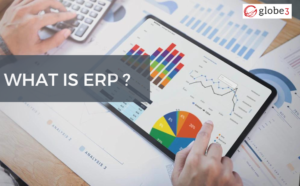
ERP for financial management is an augmented module that works in cohesion with all of a company's departments. It focuses on the financial aspects, which aid in increased productivity and decision-making. Its main difference from other traditional accounting and financial planning tools is that ERP ensures data accuracy and fast processing.

The events of 2020 impacted all industries and introduced new business issues that businesses had to solve. The COVID-19 outbreak upset several firms' plans and required them to take emergency measures. According to McKinsey & Company, between December 2019 and July 2020, the average percentage of client digital engagements increased from 36% to 58%.

ERP software is a tool that unifies and integrates various arms of an organization and helps the company automate most of its operations. The ultimate goal of using this tool is to optimize operations and free up employee time for more instinctual tasks. These goals can lead to increased revenue margins and efficiencies, as well as improved communication throughout the organization.

After the pandemic, many companies are reviewing all of their business processes. The development situation was challenging, evident in slowing but still high growth, the risk of debt distress, low levels of domestic resource mobilization, and high inflation. It makes our businesses need to change their business models and how we work in the digital economy.

As more companies migrate their on-premises ERP to the cloud, figure out the key benefits of cloud-based ERP and the reasons to migrate. First, a cloud ERP solution allows users to access their ERP software through the internet. Second, ERP software and tools are delivered and managed in the cloud rather than hosted in on-premises systems.

Today’s organizations must transform their business more frequently to adapt to new ways of working to keep up with constant change and maintain a competitive edge in the marketplace. It would be best if you had the proper enterprise resource planning (ERP) solution to facilitate this transition. However, implementing an ERP system is always challenging, and small mistakes can lead to significant business disruptions and directly impact your bottom line.

In modern business, we cannot deny that data is becoming an essential part of every company. Businesses gather data for multiple reasons, but the one that applies to every company is simple: data is critical to insight into our decision-making processes.

Spreadsheets have been the backbone of Finance and accounting for decades, despite dramatic technological changes. However, the role of accountants in the organization has evolved from budget planners to more strategic and future-oriented partners.

Field Service Management (FSM) is a system that optimizes processes and information exchange when businesses have a team of employees and technicians working outside the company, especially for operation management. This solution can improve the quality of customer care services for businesses based on urgent needs in optimizing processes, resources, and customer service quality.

Supply Chain Management (SCM) is crucial to any successful business operation. The main objectives of SCM are to increase efficiency, reduce costs, and improve customer satisfaction. By streamlining the flow of goods and materials, SCM helps to eliminate waste, reduce lead times, and increase responsiveness to customer needs. By reducing costs and increasing efficiency, SCM can help companies become more competitive, increase profitability, and improve their bottom line. At the same time, by improving customer satisfaction, SCM can help to build stronger relationships with customers and increase customer loyalty. In short, SCM is vital for businesses looking to stay ahead in today’s fast-paced and competitive marketplace. By focusing on these three key objectives, companies can ensure that their supply chain is as efficient, effective, and customer-focused as possible.

Cloud ERP software has emerged as a game-changer in the business world, providing organizations with a cost-effective and scalable solution for managing their operations. This software allows businesses to streamline their processes, increase efficiency, and make better-informed decisions, all while freeing up resources for other critical initiatives.

Construction Work-in-Progress (WIP) is a term used to describe the value of unfinished construction projects, such as houses or buildings. It is a crucial aspect of construction project management as it allows contractors to track the progress of their projects and ensure that they are on schedule and within budget.

Implementing a comprehensive ERP system for some small businesses may appear unnecessary. However, if you are starting or intend to expand your business, you will eventually require an ERP system. ERPs provide the data you need to succeed, from data analysis to reporting, tracking, accounting, and automation. We’re trying to say that spreadsheets can only take your company so far, and even though ERPs cost a lot, the return on your investment is worth it – we’ll show you why.

“HRM” stands for “Human Resource Management.” It includes all decisions and management activities that have a direct and close relationship with the business and its employees. The ability to use labor with appropriate qualifications and skills in a reasonable job becomes accurate to help the job, and the business’s goal is to have the job completed as desired.
Material requirements planning (MRP) is one of the most important real-time material management systems used in manufacturing to computing all materials and components needed to make items in the most effective manner. The MRP process is divided into three …

Projects can be small-scale tasks or significant, complex ones. But regardless of the project size, accurate tracking and reporting are essential for successful completion. So, this is where project accounting comes in. Project accounting is a method of tracking…
Projects can be small-scale tasks or significant, complex ones. But regardless of the project size, accurate tracking and reporting are essential for successful completion. So, this is where project accounting comes in. Project accounting is a method of tracking….
Rapidly advancing businesses are increasingly seeking market-leading enterprise resource planning (ERP) solutions to manage their business processes and applications in an integrated manner, giving them real-time agility and resilience to position themselves for….
An Enterprise Resource Planning (ERP) system manages all aspects of your business, including production, planning, purchasing, manufacturing, sales, distribution, accounting, and customer service, from one fully integrated system.
Most companies use ERP software to improve communication between departments and streamline business processes by providin…

Globe3 ERP is designed to help business in digitalization, enhancements and streamlining your key business. Digital technologies are used to develop business models and bringing new method in generating higher income and adding business value. Digitalization in business helps to improve the efficiency of its operations and making automation possible. Globe3 ERP using…
Construction companies face various challenges including labour shortages and supply chain disruptions. As the economy recovers, firms are seeking ways to streamline operations, reduce costs, and optimize profits. An enterprise resource planning (ERP) system can be instrumental in optimizing workflow and maximizing profitability by helping to manage and coordinate…
Enterprise Resources Planning (ERP) is one of the essential software for every business management system. By integrating all your departments for better collaborations and real-time updates, the right digital solutions will help you reduce the cost of operations and increase efficiency in your operations. So you could have a better competitive advantage. Globe3 ERP software grants you a single…
You’re struggling to keep up with the volume of orders, and customer satisfaction has been declining. You have doubts of the exact amount of product that existed in your warehouse, and your sales estimate has been based more on speculation than on solid facts. Unfortunately, this scenario can occur when your business is growing and the former processes are not able to keep up. So we’ve put…




